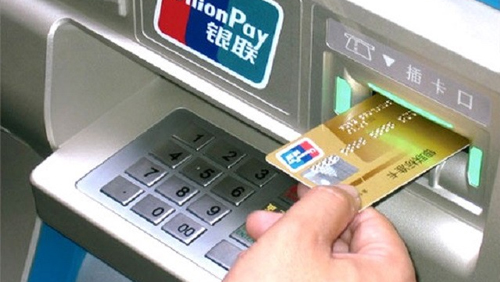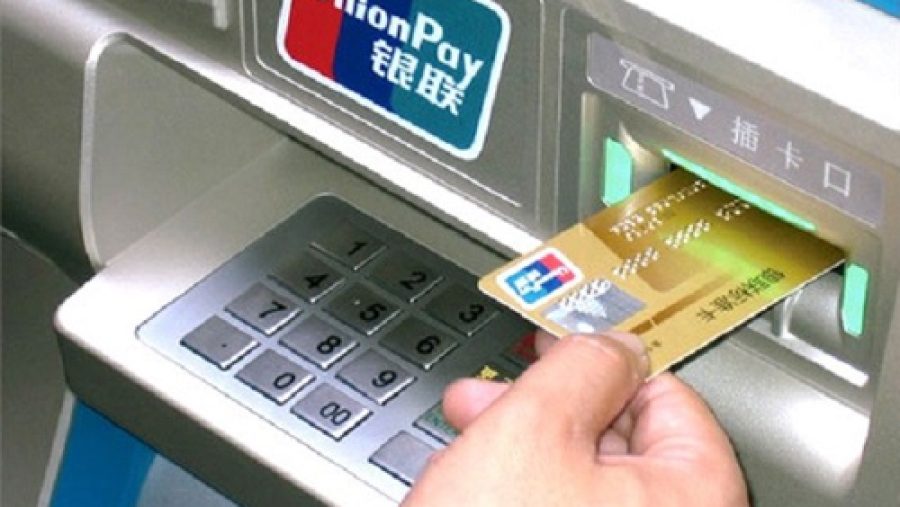Chinese bettors withdrawing money from some ATMs in Macau need to do more than punch in their PIN code. They also have to stare into a camera for six seconds so facial-recognition software can verify their identity and help monitor transactions.
Regulators in the world’s most lucrative gaming hub are deploying machines with “Minority Report”-style technology to keep tabs on capital outflows from China and watch for potential money laundering schemes. China UnionPay Co.’s network is the first to use the software, which will be installed in all the city’s 1,200 cash dispensers.
President Xi Jinping’s government is trying to curtail the overseas shifting of currency that helps suppress the value of the yuan and drain capital reserves. The People’s Bank of China imposed controls as the amount of money leaving China last year topped USD816 billion, according to data compiled by Bloomberg, with Macau considered a primary exit used by private citizens and corrupt government officials alike.
“This is aimed at illicit outflows of capital from China,” said Sean Norris, Asia Pacific managing director at Accuity in Singapore. “It’s aimed at people drawing out money in Macau, going to the casino, betting very little, getting forex from there and moving it.”
The new ATMs represent the first widespread consumer application of facial-recognition security programs in Greater China, where privacy concerns aren’t debated as vigorously as in the U.S. or Europe. Government censors scrub the internet of content they deem harmful to the populace or the authority of the Communist Party, and Chinese consumers regularly fork over personal information to mobile payment, e-commerce and food-delivery apps on their smartphones.
“They’re not well-educated about how privacy should be important to them,” said Simic Chan, a senior analyst at Fung Global Retail & Technology in Hong Kong. “They feel it’s a norm to have their data collected.”
The rollout in Macau comes as casino revenue posted its largest gain last month in more than three years. Gross gaming receipts in May rose almost 24 percent from a year earlier to MOP22.7 billion (USD2.8 billion), according to the Gaming Inspection and Coordination Bureau.
Identifying the firehoses flooding Macau with money is one reason China’s State Administration of Foreign Exchange issued a June 2 notice requiring banks and China UnionPay to report every overseas cash withdrawal and card transaction of more than 1,000 yuan, starting in September.
The campaign to halt capital outflows through gambling-related channels has also ensnared foreign casinos who market too aggressively in China where gaming is banned. Earlier this week, more than a dozen employees of Melbourne-based Crown Resorts Ltd. were sentenced to up to ten months jail by a Shanghai court for illegally promoting gambling.
“Although there has been no major policy change in the past six months, we have seen signs of heightened enforcement, particularly on anti-money laundering issues,” said Daiwa Capital Markets Hong Kong Ltd. analyst Jamie Soo in a June 22 note. “It seems reasonable to expect a further heightening of enforcement.”
Already, the government in December limited withdrawals to MOP5,000 for each transaction from MOP10,000.
It’s common in Macau to see people using multiple bank cards to withdraw cash from multiple accounts, or for relatives or friends of the account holder to withdraw money without them being present.
“This initiative is less about innovation than it is about customer identification and management,” said James Lloyd, Asia-Pacific FinTech Leader at Ernst & Young in Hong Kong. “It seeks to better identify who is involved in the money flow.”
Most of the ATMs in Macau are made by Duluth, Georgia-based NCR Corp., and the facial-recognition technology would be installed inside existing boxes. Customers first insert a bank card and enter their PIN, and then the machine asks to scan their ID card and take a photo.
The world’s largest ATM manufacturer, with about 1,000 machines currently in the Chinese territory, declined to comment on the software, citing a non-disclosure agreement with the Macau government and related parties. The monetary authority wouldn’t elaborate, and the China Banking Regulatory Commission and Finance Ministry both declined to comment.
The Macau Monetary Authority is starting with China UnionPay ATMs because that’s the biggest network in Macau and has the largest transaction amounts. Other payment providers, including Visa Inc. and Mastercard Inc., will be required to support the technology in the future, it said without providing a timetable.The costs of retrofitting ATMs will be borne by banks, it said.
The global biometrics business is poised for exponential expansion, according to market researcher Tractica. Revenue generated by hardware and software that scan faces, fingerprints, voices and irises is expected to reach $15.1 billion by 2025, compared with $2.4 billion last year.
Apple Inc., Samsung Electronics Co. and Xiaomi Corp. install biometric features on their smartphones. Facebook Inc. has developed a technology that can identify people even when their faces aren’t clearly shown in pictures.
Chinese ID cards are valid for as long as 20 years. The recognition software typically can see through the aging process and even plastic surgery, said Chris Foye, a London-based market planning manager at LexisNexis Risk Solutions, a provider of identity management solutions.
The facial-recognition system at Macau’s new ATMs involves a relatively basic version of the technology, Chan said.
Alibaba Group Holding Ltd. and Baidu Inc. are investing in biometric technologies to secure mobile payment services and smooth e-commerce flows that have reached 5 trillion yuan ($734 billion) annually.
Megvii Inc., a Beijing-based developer of such technology, raised at least $100 million from investors such as Foxconn Technology Group in December. The company doesn’t supply its technology for ATMs, though it provides face-scanning systems to Ant Financial, the financial services affiliate of Alibaba, said Xie Yinan, a spokesman.
It would be difficult for hackers to steal banking information through the software because the ATMs use multiple means – including PIN numbers – to verify identities, Xie said.
“The region is looking at this development with interest, and if successful in Macau, there is no reason why it would not be adopted more widely,” Foye said.
(Bloomberg / Macau Daily Times)






